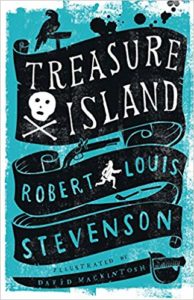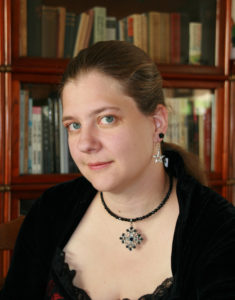Say hello to Chris! she’s someone I’ve known on Twitter for ages, so it was wonderful to receive her submission for my speculative fiction interview series.
What was the first speculative story you ever remember reading?

Tetful by Eric
A graphic novel about a werewolf: Tetfol, by the Belgian artist Eric. I was six years old and marked as a paranormal horror fan for life.
Who is your favourite author? Why?
I don’t really have one. When a story strikes a chord with me, it doesn’t necessarily mean the rest of that author’s work does, too. If ‘favourite’ means ‘most read’, it would be Terry Pratchett, but Michael Crichton, M.N. Seeley, R.H. Hale and Laura Purcell are other authors I greatly admire and whose work I love to read.
What do you like most about the genre(s) you read?
The darkness within ourselves. I’m not interested in monsters roaming the forest/sea/house when they only exist to scare the main characters. I much prefer the ambiguity of psychological horror and the surrealistic imagery when that is mixed with supernatural elements.
More and more authors seem to be writing cross-genre stories these days. How do you feel about this trend?
I’m a fan, both as a reader and as a writer. Genre conventions exist, but in and of themselves, there is only so much you can do with them. Cross-genre stories can mix those conventions to create fresh twists and tweaks that keep the audience captivated.
If you could name a pet after one character, which character would you choose? Why?

Treasure Island by Robert Louis Stevenson
Captain Flint. The pirate, not the parrot! In Treasure Island, Flint is a terrifying shadow whose reach extends beyond the grave, never seen but always present. As a kid, I found that influence more fascinating than Jim Hawkins’ treasure hunt. Then Starz’ TV series Black Sails, which tells the story behind that famed treasure, made Captain Flint one of the most complex, well-rounded and realistic characters ever to appear on screen.
What fictional world would you never want to visit?
I’d say the future as Orwell’s 1984 describes it, but we’re already in the middle of that…
What fictional world would you want to visit?
Discworld! I feel I’d fit in better there than I do in our society.
Sharing spoilers with people who haven’t read the book or seen the film/show is a hot topic on Twitter and across many fandoms. How do you feel about sharing or overhearing spoilers?
Personally, I don’t mind spoilers. I try not to share any because I know many people hate them, but to me, a spoiler can convince me to give that story a go. The premise alone may not interest me, but when I already know the plot twist (or even the ending), I get curious to learn how the writer(s) structured the plot and the characters towards that end.
 Which series do you think should be made into a TV show or film next?
Which series do you think should be made into a TV show or film next?
Several people have told me my Kalbrandt Institute Archives series would make a good TV show, haha! But in all seriousness, the first story that immediately came to mind as great TV series is the graphic novel Locke & Key by Joe Hill and Gabriel Rodriguez. Luckily, more people thought so, and it is currently in production.
Which TV show or film do you think should be turned into a book?
I’d love to read the novelization of Black Sails! That would be a Game of Thrones-sized series, given that the show has the same intricacy and complexity as an epic novel. Few series have that, so for the most part I’m not a fan of adapting written-for-screen stories to page.
Bonus Questions
What is the most unusual or interesting way you’ve come up with an idea for one of your creative works?
When I create a story, I collect elements that this story needs to tell itself (events, setting, characters, style) and slot them together like a jigsaw puzzle. Most of those jigsaw pieces result from serendipity or plain old research, but some of the more surreal ideas were inspired by psychotic episodes.
Sometimes characters don’t do what their creators want them to do. If this has ever happened to you, how did you deal with it?
When it does, it means you’ve done a good job with this character and gave them a unique personality that develops as the story does. A side-effect of this is that you may find that the character’s most likely response to a given situation no longer fits the original plot you devised. So, improvise!
I hold consistency in high regard, so when a character wants to go left instead of right, I adapt the plot accordingly. This often only requires a brief sidestep before they naturally get back with the program, but sometimes their choices influence the entire main plot. That is why I only set the beginning and the end of a book before I start writing: to make room for the unforeseen developments that spice up a story.
What is your favourite trope?
Brooding, tormented male characters searching for redemption. Not for the purpose of redeeming them, but because recreating the blood, hallucinations and anguish that come with drowning in your own nightmares is a big part of the reason I started writing in the first place.
What tropes do you try to avoid in your stories?
Romantic subplots. I often find those distracting. My characters aren’t virgins and they do have crushes or longterm relationships, but don’t expect them to fall madly in love with each other. They’ve got bigger fish to fry!
 About Chris:
About Chris:
Inspired by first-hand experiences, Chris H. Chelser writes supernatural horror about ghosts, history, and the human soul. She lives in the Netherlands with her family, where the demons under the bed keep her company while she works. Her books include Kalbrandt Institute Archives series, her novel The Devourer, various short stories and the upcoming surrealistic novel The Ship That Tried To Sink Itself.
You can find her on www.chchelser.com and on Twitter: @chrischelser.
